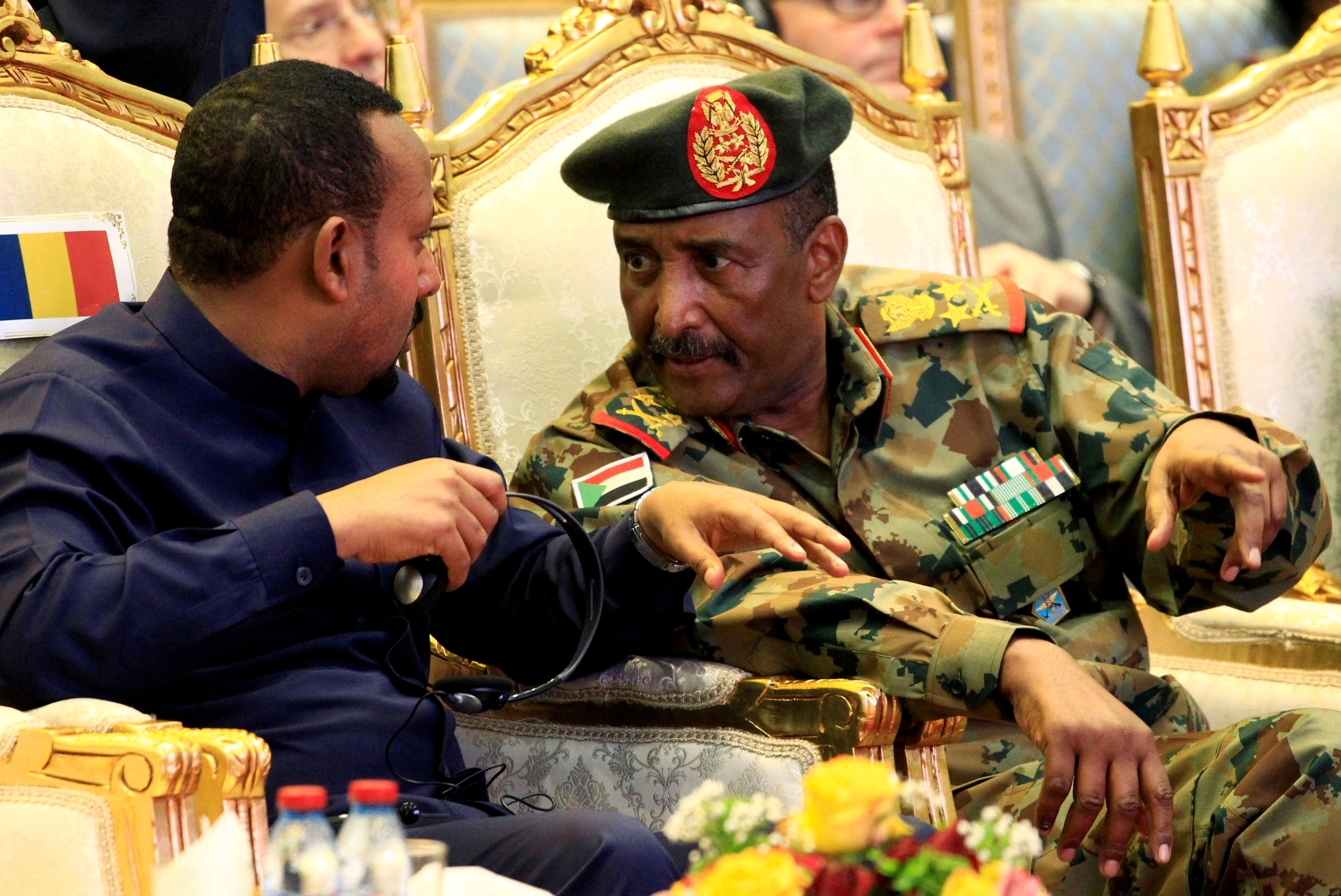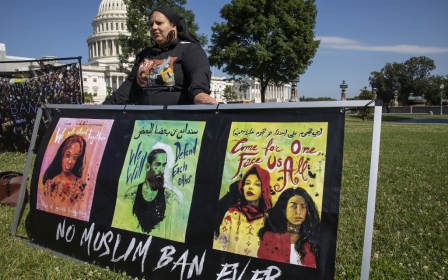Sudan general's meeting with Netanyahu sparks row between military and civilians

Monday’s meeting between the leaders of Israel and Sudan has thrown Khartoum’s rulers into disarray, and stoked tensions between the various factions making up the Sudanese government.
For Israeli Prime Minister Benjamin Netanyahu, the dialogue with General Abdel Fattah al-Burhan, head of Sudan’s ruling Sovereign Council, was a clear victory. The two discussed normalisation of ties between two countries that have had zero diplomatic relations since the 1948 Nakba.
“History!” Netanyahu tweeted in Hebrew.
For Burhan, however, the meeting in Uganda has sparked unforeseen tensions between the civilian Forces and Freedom and Change (FFC) coalition and its military partners in government.
Questions are now being asked about the moves towards Israel the Sudanese military is making with Emirati and US encouragement, with secret negotiations apparently ongoing for some time.
Sudan has already given Israel the green light to fly over its airspace, a military source told Middle East Eye on condition of anonymity.
The approval was given to Israel “some months ago”, the source said. “Some technical details are underway to reach a final agreement.”
Burhan ‘consulted no one’
Immediately after the meeting came to light, Sudanese officials distanced themselves from the summit, indicating it was a unilateral decision by Burhan.
The general is the most senior leader of the transitional government that emerged after a power-sharing agreement between civilian and military forces in August following the overthrow of president Omar al-Bashir.
Though he claimed that Prime Minister Abdalla Hamdok had been notified about the meeting in advance, the premier’s office denied such information was ever received.
And on Thursday, the spokesman the Sudan’s transitional government and minister of information, Faisal Mohamed Saleh, said that Hamdok was not aware and the meeting had been “a personal initiative”.
'We are a revolutionary government that represents the demands of our people, including freedom, peace and justice, and we would never betray these ideals'
- Faisal Mohamed Saleh, information minister
“During a meeting between the cabinet and the Sovereign Council, Burhan told us that the meeting was based on his own personal initiative and responsibility,” Saleh said, adding that the general had described it at a “pilot”.
“He didn’t make any pledges of normalisation to his Israeli counterpart,” Saleh said.
Sudan is in a period of transition following the toppling of longtime autocrat Bashir last year. Burhan heads the Sovereign Council, a body made up of military and civilian figures.
It is tasked with overseeing Sudan’s transition from military to civilian rule, while Hamdok’s cabinet governs in the meantime.
According to Saleh, major foreign policy decisions, such as normalising ties with Israel, are not part of the transitional government’s mandate, according to the constitutional declaration agreed between the different forces.
“We are a revolutionary government that represents the demands of our people, including freedom, peace and justice, and we would never betray these ideals,” he said.
Army support
The national army has thrown its weight behind its commander Burhan.
Army spokesman Amir Mohamed al-Hassan told reporters in Khartoum that the military’s leaders unanimously supported Burhan’s vision, believing it serves the “highest national interests” of the Sudanese people.
Meanwhile, Burhan has not only said Hamdok was aware two days before the Uganda meet-up, but that he had stressed that such contact could help remove highly damaging US sanctions.
The general also denied any final agreement had been made with Netanyahu to normalise ties, but said Sudan should have a pragmatic foreign policy regarding Israel that serves his country’s interests, rather than “slogans and romantic mindsets”.
“We are in desperate need of bread and fuel, and I have a huge responsibility to rescue this nation,” he said.
“Our economic situation is bad. We can’t improve it unless we attract international investments by first removing the sanctions … Unless the sanctions are removed we are nobody in the world.”
Unconstitutional move
The Sudanese Professionals Association (SPA), a powerful body that led the revolution against Bashir, rejected such notions, however, describing Burhan’s move as unconstitutional and a coup attempt against the civilian component of the government.
The SPA said the army should take a neutral stance on political affairs.
“The move by the national army is a serious violation against the path of the revolution and the constitutional declaration that governs the transitional period,” it said in a statement to MEE.
“General Burhan has no right to use his position as commander of the army to advance his political views.”
Sudanese legal expert Wail Ali Saeed agreed that the move is unconstitutional.
“The constitutional declaration states clearly that the planning of foreign policy is exclusively the right of the government and the Sovereign Council has nothing to do with it,” he told MEE.
'The constitutional declaration states clearly that the planning of foreign policy is exclusively the right of the government and the Sovereign Council has nothing to do with it'
- Wail Ali Saeed, legal expert
“The head of the Sovereign Council wants to say that the issue is related to the national security of the country in order to legitimate the move, but that is incorrect.”
Meanwhile, a group of lawyers has filed a lawsuit against Burhan, citing a Sudanese law dating back to 1958 that bans relations with Israel.
According to the law, any political, military, trade or other relations with Israel is punishable by up to 10 years in prison.
And in the Sovereign Council itself, Burhan’s move prompted the resignation of Rashad Faraj al-Tayeb, head of foreign policy.
“I resigned today because I can’t see the Israeli flag appear in Sudanese territory officially, and I can’t accept this clear violation to the Sudanese’s constant values of solidarity with the Palestinian people and rejection of the injustice of the Jewish state,” he said in statement seen by MEE.
Confrontation
According to Sudanese political analyst Durra Gambo, the Uganda trip is indicative of the military staging a coup of sorts against civilian elements, and is a serious sign that the generals may not hand over power as promised.
“These development shows clearly the intention of the generals to reposition themselves internationally and regionally, in order to exclude the civilians and rule the country alone,” she stated.
“The main conflict here for us as Sudanese isn’t even about the normalisation with Israel or not, it’s about the future of the transitional period and our revolution, and the democratisation of our country” she stressed.
“The military is showing its muscles now by strengthening itself with ties to Israel and the United States, which blessed the meeting between Netanyahu and Israel. So the question now is whether Washington will support democracy in Sudan or not.”
Gambo warned that the confrontation and blame-game between the military and civilian leaders may lead to collision between the two sides that could bring about the transition phase’s collapse.
“The transitional period may lead to collapse if the military and civilians can’t make a quick understanding,” she said.
Middle East Eye delivers independent and unrivalled coverage and analysis of the Middle East, North Africa and beyond. To learn more about republishing this content and the associated fees, please fill out this form. More about MEE can be found here.





